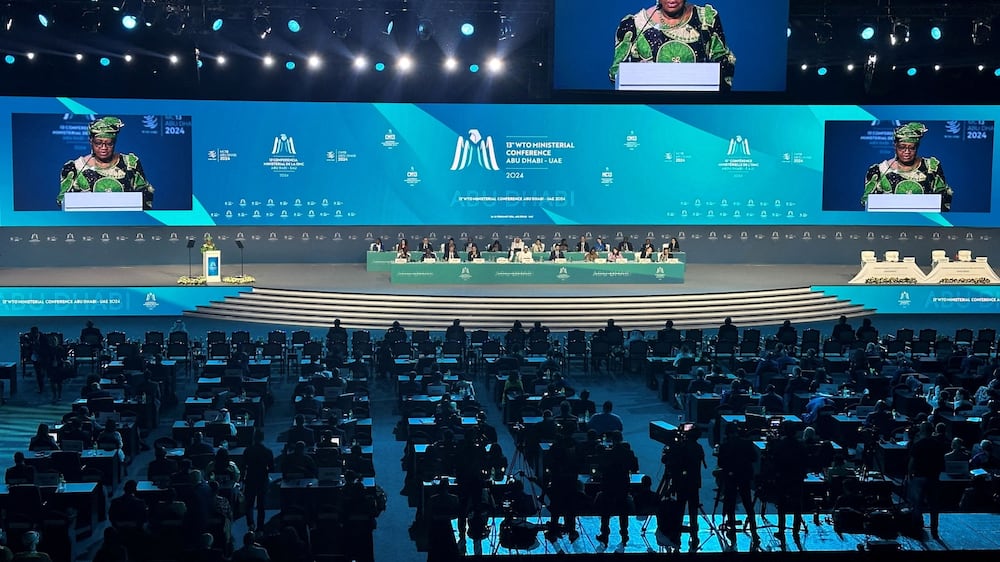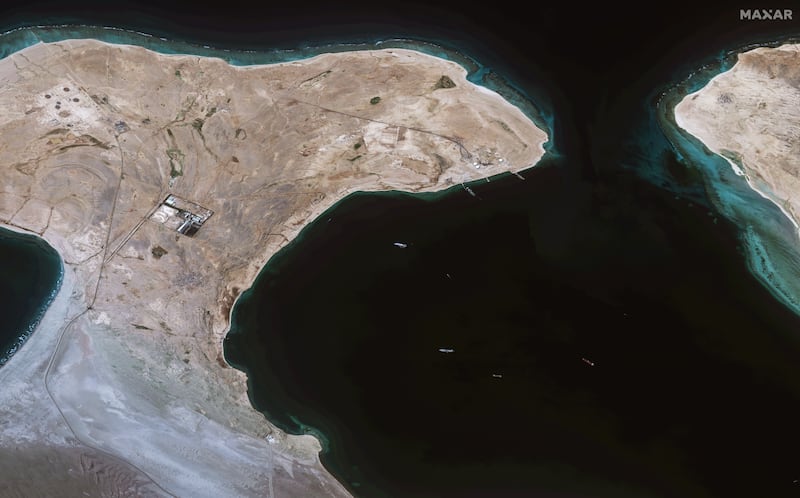The continuing conflicts in the Middle East are expected to have a contained effect on the region's trade activity and would only have "really severe" implications if they escalate, the World Trade Organisation has said.
Global trade is forecast to rebound in 2024, but this would be limited by geopolitical tensions and economic policy uncertainties, setting the stage for flat growth over the next two years, the Geneva-based body said at the launch of its Global Trade Outlook and Statistics 2024 report on Wednesday.
The Middle East, however, is expected to hold steady despite the Israel-Gaza war and attacks in the Red Sea, WTO's chief economist Ralph Ossa said in a press conference from Geneva.
"One thing that we see so far [is that] tensions in the Red Sea of course directly affect international trade … particularly between Asia and Europe," he said in response to a question from The National.
Talks between Hamas and Israel to end the war in Gaza are taking place in Cairo, but have hit a stumbling block as the militant group has reportedly raised several objections to proposals raised this week.
"However, so far our analysis suggests that this effect is not so severe. And for it to become really severe, what would have to happen is the crisis would have to escalate and really start to affect energy markets. So we would have to see price spikes in oil for this to unfold," Mr Ossa said.
Global trade volumes fell 1.2 per cent in 2023, but are expected to bounce back to a 2.6 per cent growth this year, the WTO said.
The decline in 2023 was driven by high energy prices and inflation, which heavily weighed on demand for trade-intensive manufactured goods, according to the WTO, which held its 13th Ministerial Conference in Abu Dhabi in February.
However, this was “relatively small” and above pre-pandemic levels throughout 2023, it said, adding that growth is expected to recover gradually over the next two years as inflationary pressures ease and household incomes improve.

It also obscures strong regional variation, as import demand fell sharply in Europe, declined in North America, remained flat in Asia and increased in major fuel-exporting economies, the WTO said.
“Weak demand reduced export volumes in Europe and prevented a stronger recovery in Asia, while the picture in other regions was mixed. If the forecast is realised, Asia will make a bigger contribution to trade volume growth in 2024 and 2025,” the report said.
Global gross domestic product growth, on the other hand, also slowed down in 2023, albeit not as much as trade volume growth, the WTO said.
Real GDP growth, weighted at market exchange rates, dropped to 2.7 per cent in 2023 from 3.1 per cent in the previous year. It is projected to remain mostly stable in the next two years, inching down to 2.6 per cent in 2024 before returning to 2.7 per cent next year, it said.
Although global trade has been “remarkably resilient” in recent years despite a number of major economic shocks, risks to the forecast are on the downside because of geopolitical tensions and policy uncertainty.
These include the Russia-Ukraine and Israel-Gaza wars, as well as the conflict in the Red Sea, where shipments have been forcibly diverted as a result of Yemeni Houthi rebel attacks on shipping.
“It's imperative that we mitigate risks like geopolitical strife and trade fragmentation to maintain economic growth and stability,” Ngozi Okonjo-Iweala, director general of the WTO, said in a statement.
Trade is one of the key pillars of the global economy as it contributes to efficiency and promotes competitiveness, allowing countries to access goods and labour forces.
But while geopolitical tensions have affected trade patterns, these have had a “marginal” effect and “have not triggered a sustained trend towards deglobalisation”, the WTO said.
Wednesday's WTO report also confirms its forecast in February, in which it said global trade growth would be likely to miss its target this year.
On October 5, the WTO forecast a 3.3 per cent expansion in global trade for 2024, but this was made before the Israel-Gaza war that began two days later. Still, the new forecast is a marked rebound from the 0.8 per cent growth recorded in 2023.
However, a high degree of uncertainty remains with the current outlook, “due to the large number of risk factors present in the global economy”, the WTO said on Wednesday.
Inflation, meanwhile, is expected to decline this year and would lead to a rebound in consumption of manufactured goods, which in turn should boost trade volume growth in 2024 and 2025.
Inflation, which had spiked at the start of the Russia-Ukraine war in February 2022, remained well above pre-pandemic levels by the first quarter of 2024, the WTO said.
Global energy prices, on the other hand, were down about 41 per cent on average from their peak in the first two months of 2024, but remained 30 per cent higher than in 2019, the report said.
Oil prices had recorded a strong gain in the first quarter of the year amid Opec+ output cuts and rising fears of supply disruption caused by conflict, rising about 13 per cent in the first three months of 2024.
Any consistency in the drop of inflation levels would lead policymakers to eventually cut interest rates, the WTO said. The US Federal Reserve is expected to start cutting rates at its June meeting, which would prompt other major central backs to follow suit.
WTO countries' ministers looks to future in Abu Dhabi

Central banks in advanced economies raised interest rates beginning in 2022 to mitigate inflationary pressures, but that resulted in eroded incomes and reduced consumption of goods, the WTO said.
Cutting rates “should stimulate investment spending [albeit with a lag], which is intensive in capital goods trade,” it added.
“Tighter monetary policy has largely succeeded in bringing down inflation, but correctly timing the relaxation of these policies will be challenging for policymakers.”
The WTO also said that trade will not be dictated solely by the US presidential elections this year, even with presumptive Republican candidate and former president Donald Trump threatening more tariffs, particularly on China, in the event he returns to the White House.
"It's not just the US; something like 50 countries this year have elections, which of course adds to trade policy uncertainty," Mr Ossa said.







